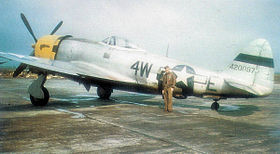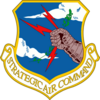| 506th Air Refueling Squadron | |
|---|---|
 Republic P-47D Thunderbolt 44-200097 of the 406th Fighter Squadron at Furth/Industriehafen Republic P-47D Thunderbolt 44-200097 of the 406th Fighter Squadron at Furth/Industriehafen | |
| Active | 1953–1955 |
| Country | |
| Branch | |
| Role | Air Refueling |
| Motto(s) | Any Time Any Where |
| Engagements | European theater of World War II |
| Decorations | Distinguished Unit Citation |
| Insignia | |
| 506th Air Refueling Squadron Emblem |  |
| ETO Fuselage Code and Squadron Color | 4W Yellow |
The 506th Air Refueling Squadron is an inactive United States Air Force unit. It was last assigned to the 42d Air Division at Bergstrom Air Force Base, Texas where it was inactivated on 1 July 1957 and its personnel and equipment transferred to the 92d Air Refueling Squadron.
The Squadron was first activated as the 406th Fighter Squadron in 1943, one of the original squadrons of the 371st Fighter Group. The squadron saw combat in the European theater of World War II before being inactivated in 1945, earning a Distinguished Unit Citation for its attacks in March 1945 that contributed to the defeat of Axis forces in southern Germany.
The 506th Air Refueling Squadron was established in 1953 by Strategic Air Command (SAC) at Dow Air Force Base, Maine and equipped with rigid flying boom KB-29P Superfortress tankers. The squadron mission was to provide in-flight refueling for its parent wing and other USAF units. It moved to Bergstrom in 1955 and was inactivated there when SAC transferred its fighter force to Tactical Air Command.
History
World War II
The 406th Fighter Squadron was activated ar Richmond Army Air Base, Virginia in the summer of 1943 as one of the three original squadrons of the 371st Fighter Group. The squadron trained in the northeastern United States with Republic P-47 Thunderbolts under First Air Force before moving overseas in the spring of 1944.
Upon arriving in England, the squadron became an element of Ninth Air Force at Bisterne Close, England. The squadron's first combat operation was a fighter sweep over Occupied France. Prior to Operation Overlord, the invasion of Normandy, the 406th flew fighter sweeps, dive bombing and escort missions.
On D-Day the 406th patrolled the beachhead. attacking railroads, trains, vehicles. gun emplacements and other targets. Soon after the invasion, the squadron moved to France and participated in the air interdiction that preceded the Allied breakout at St Lo in late July and supported the following drive across northern France. It continued to operate in northeastern France and southwestern Germany through the winter of 1945, attacking storage dumps, marshalling yard, factories, bridges, roads, and vehicles. In December 1944 it provided close air support for ground forces engaged in the Battle of the Bulge.
The squadron was awarded a Distinguished Unit Citation for its attacks between 15 and 21 March 1945 that contributed to the defeat of Axis forces in southern Germany. It continued combat operations until the Surrender of Germany in May. The squadron remained with the occupation forces in Germany until October 1945 when it returned to the United States and was inactivated.
Cold War
The 506th Air Refueling Squadron was established on 25 September 1953 by Strategic Air Command (SAC) at Dow AFB and initially equipped with rigid flying boom KB-29P Superfortress tankers. Its mission was to provide in-flight refueling to the Republic F-84 Thunderjet strategic fighters of its parent wing. The squadron also supported other USAF units as directed. In 1954 the squadron deployed to Kindley Air Force Base, Bermuda to support SAC fighters of the 508th Strategic Fighter Wing.
In 1955 SAC concentrated its strategic fighter units, and the 506th's parent 506th Strategic Fighter Wing moved to Tinker Air Force Base, Oklahoma in March. The squadron remained at Dow and was reassigned to the 4060th Air Refueling Wing until August, when it moved to Bergstrom Air Force Base, Texas, where it was assigned to the 42d Air Division, the parent of the 12th Strategic Fighter Wing, to which the squadron was attached.
The 506th was inactivated at Bergstrom on 1 July 1957 and its mission, personnel, and equipment were transferred to the 92d Air Refueling Squadron, which was activated that same day to assume SAC resources at Bergstrom as the 42d Air Division and SAC fighter organizations were transferred to Tactical Air Command.
The 406th Fighter Squadron and the 506th Air Refueling Squadron were consolidated in 1985, but the consolidated unit has not been active.
Lineage
|
406th Fighter Squadron
|
506th Air Refueling Squadron
|
Assignments
- 371st Fighter Group: 15 July 1943 – 10 November 1945
- 506th Strategic Fighter Wing: 25 September 1953
- 4060th Air Refueling Wing: 1 March 1955
- 42d Air Division: 15 August 1955 – 1 July 1957 (attached to 12th Strategic Fighter Wing)
- Air Mobility Command to activate or inactivate as needed, 12 June 2002
Stations
|
|
Aircraft
- Republic P-47 Thunderbolt, 1943–1945
- Boeing KB-29 Superfortress, 1953-unknown
- Boeing KC-97 Stratotanker, unknown-1957
Awards and campaigns
| Award streamer | Award | Dates | Notes |
|---|---|---|---|
| Distinguished Unit Citation | 15 March 1945-21 March 1945 | 406th Fighter Squadron, Germany |
- 406th Fighter Squadron cited in the Order of the Day, Belgian Army for the period 6 June 1944 – 30 September 1944
References
Notes
- Watkins, pp. 44–45
- ^ Maurer, Combat Squadronspp. 497–498
- ^ Maurer, Combat Units, pp. 257–258
- Abstract, History 47 Air Division Jan 1955 (retrieved 13 October 2013)
- Abstract, History 506 Strategic Fighter Wing Oct 1954 (retrieved 13 October 2013)
- ^ Mueller, p. 32
- ^ Abstract, History 42 Air Division May–Jul 1957 (retrieved 13 October 2013)
- ^ Ravenstein, p. 27
- ^ Department of the Air Force/MPM Letter 662q, 19 September 85, Subject: Reconstitution, Redesignation, and Consolidation of Selected Air Force Tactical Squadrons
- ^ Lineage and stations through 1945 in Maurer, Combat Squadrons, pp. 497–498
- ^ DAF/XPM Letter 303s, 12 June 2002, Subject: Air Mobility Command Expeditionary Units
- Ravenstein, pp. 273–274
- Abstract, History 506 Strategic Fighter Wing March 1955 (retrieved 13 October 2013)
- Station number in Anderson
- ^ Station number in Johnson
Bibliography
![]() This article incorporates public domain material from the Air Force Historical Research Agency
This article incorporates public domain material from the Air Force Historical Research Agency
- Anderson, Capt. Barry (1985). Army Air Forces Stations: A Guide to the Stations Where U.S. Army Air Forces Personnel Served in the United Kingdom During World War II (PDF). Maxwell AFB, AL: Research Division, USAF Historical Research Center. Archived from the original (PDF) on 4 March 2016. Retrieved 7 July 2012.
- Johnson, 1st Lt. David C. (1988). U.S. Army Air Forces Continental Airfields (ETO) D-Day to V-E Day (PDF). Maxwell AFB, AL: Research Division, USAF Historical Research Center. Archived from the original (PDF) on 29 September 2015.
{{cite book}}: CS1 maint: numeric names: authors list (link) - Maurer, Maurer, ed. (1983) . Air Force Combat Units of World War II (PDF) (reprint ed.). Washington, DC: Office of Air Force History. ISBN 0-912799-02-1. LCCN 61060979.
- Maurer, Maurer, ed. (1982) . Combat Squadrons of the Air Force, World War II (PDF) (reprint ed.). Washington, DC: Office of Air Force History. ISBN 0-405-12194-6. LCCN 70605402. OCLC 72556.
- Mueller, Robert (1989). Air Force Bases, Vol. I, Active Air Force Bases Within the United States of America on 17 September 1982 (PDF). Washington, DC: Office of Air Force History. ISBN 0-912799-53-6.
- Ravenstein, Charles A. (1984). Air Force Combat Wings, Lineage & Honors Histories 1947–1977. Washington, DC: Office of Air Force History. ISBN 0-912799-12-9.
- Watkins, Robert (2008). Battle Colors. Vol. III Insignia and Markings of the Ninth Air Force in World War II. Atglen, PA: Shiffer Publishing Ltd. ISBN 978-0-7643-2938-8.
| Aerial refueling units of the United States Air Force | |
|---|---|
| Wings | |
| Groups | |
| Squadrons |
|
| Stations |
|  | |||||||||||||||||||||||||
|---|---|---|---|---|---|---|---|---|---|---|---|---|---|---|---|---|---|---|---|---|---|---|---|---|---|---|---|
| Units |
| ||||||||||||||||||||||||||
| |||||||||||||||||||||||||||
| Airfields |
|  | |||||||||||||||||||
|---|---|---|---|---|---|---|---|---|---|---|---|---|---|---|---|---|---|---|---|---|---|
| Units |
| ||||||||||||||||||||
| |||||||||||||||||||||
